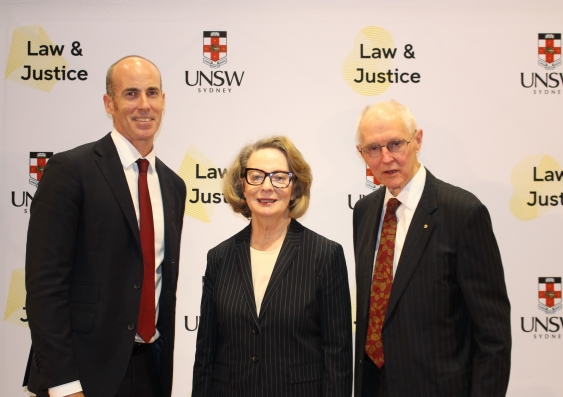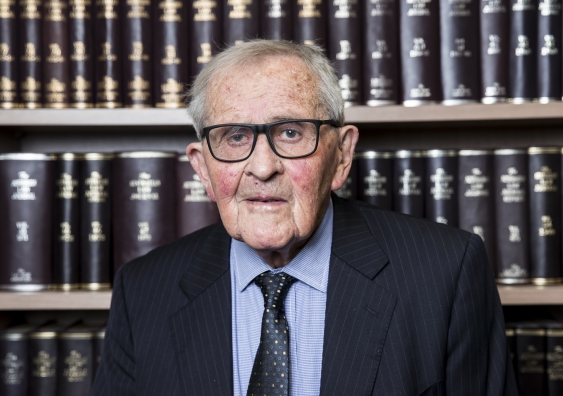From the profane to the profound: Magistrate David Heilpern on reforming Australia’s legal system
2024-11-01T13:29:00+11:00

Magistrate Professor David Heilpern spoke at UNSW Sydney’s annual Hal Wootten Lecture.
Photo: Louise Reily
At the annual Hal Wootten Lecture, respected retired Magistrate Professor David Heilpern laid out three reforms that could drastically transform the legal landscape.
David Heilpern doesn’t want to re-write the law. But the retired magistrate, who was the youngest in Australia when he was appointed in 1998, said that changes to the legal system are desperately needed.
The message was heard at UNSW Sydney’s annual Hal Wootten Lecture, named in honour of the University’s founding Dean of Law.
Prof. Heilpern, who is the Dean and Chair of Law at Southern Cross University, told the crowd how, early into his career on the bench, he managed to clear thousands of cases off the Local Court list when he determined that the word ‘fuck’ was no longer offensive. That decision made headlines when it was first handed down, but the lasting impact was to keep people out of courtrooms if their sole crime was to swear at a police officer.
But Prof. Heilpern said we need to go much further when it comes to legal reform, and in his lecture he outlined three other “simple, non-controversial law reforms” that could be implemented given the right political and societal will.
Reform one: remand
The situation with remand in Australia is utterly shameful, according to Prof. Heilpern.
“The words ‘innocent until proven guilty’ ring hollow when 42 per cent of people in custody in NSW are actually only bail refused, not convicted,” he said.
“Worse still, more than 60 per cent of young people in custody are there on remand.”
He argued that young people fare worse than adults, due to of a lack of resources for young offenders.
The court logjam is so severe that it can mean the wrong people are refused bail, while others are released when they shouldn’t be, something that Prof. Heilpern reflected on during his lecture.
“I could give each application only a few minutes at most, and the consequences of error can be fatal,” he said.
“Like almost every Magistrate, I granted bail to men who then killed, and refused bail to those who died in custody.”
Prof. Heilpern called for changes so that defendants can have their refused bail appeal heard not only in the Supreme Court, where delays lead to months of waiting, but also in the District Court.
“The bail list in the Supreme Court would evaporate, and free up enormous resources,” he said.
“I imagine that this process would be much more likely to ensure that those who should be refused bail are, and those who should not, are not.”
Reform two: victims rights
Prof. Heilpern also spoke of the desperate need for the law to have greater sensitivity to victims of crime.
He recounted a troubling case where police stumbled upon video evidence of a horrific rape case during an illegal search. When it went to court, the defence team successfully argued that the incriminating evidence was obtained illegally, and the whole case was thrown out.
Prof. Heilpern argued the court’s determination was “completely at odds with community values.”
“To suggest that a one-hour illegal search ought to lead to the dismissal of four rape charges is nothing short of outrageous,” he said.
“Even if it is legally arguable, then the law should be changed. The court abrogated its responsibility by making no mention of the role and rights of the victim, relegating her to the epitome of the silent, hidden, immaterial non-party.”
To avoid this, Prof. Heilpern called for amendments so that small breaches of process and law won’t necessarily override a far more serious crime, and that the victims’ rights to have defendants tried must be considered.
Reform three: drug law
David Heilpern remarked that when he started out as a lawyer he represented “abortionists, prostitutes, SP bookmakers, vagrants, homosexuals, blasphemers and now all of these are decriminalised or legalised or just regulated.”
But he argued the law hasn’t moved with the times when it comes to drugs.
“Drug law reform seems to be stuck in the 1950s with all the waste of police, court, legal profession and prison resources all in an effort to deal with at worst a victimless health problem and at best harmless experimentation,” he said.
Prof. Heilpern called for reform, so that people caught with tiny amounts of medicinal mushrooms (Psilocybin) don’t end up behind bars. He also argued that too much time is spent testing people for drug driving, often picking up people who have taken medicinal cannabis, and resources could be better spent elsewhere.
“Australia does more random roadside drug checks than all the rest of the world combined. There is not a single coronial finding in Australia that suggests medicinal cannabis is to blame for road trauma,” he said.
“Almost a million Australians are criminalised by this absurd provision, probably the greatest criminalisation of our population in Australian legal history.”
UNSW Dean of Law & Justice, Professor Andrew Lynch, said David Heilpern’s lecture highlighted many examples of where law meets justice.
“The Annual Hal Wootten lecture provides the opportunity to reflect on the personal example of Hal’s life – a life lived greatly in the law – and to remind us of the roles of compassion, integrity and a commitment to justice,” he said.
Media enquiries
For enquiries about this story and interview requests please contact Julia Holman:
Tel: 0435 124 673
Email: julia.holman@unsw.edu.au




